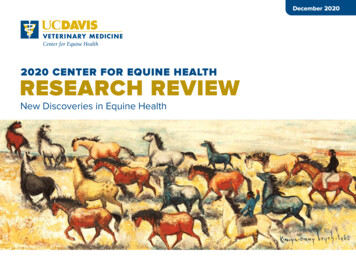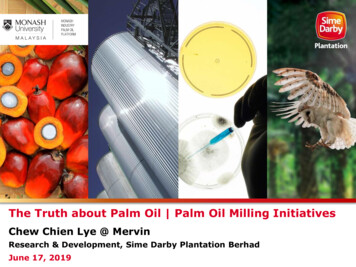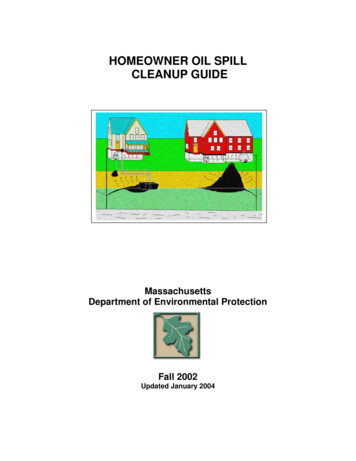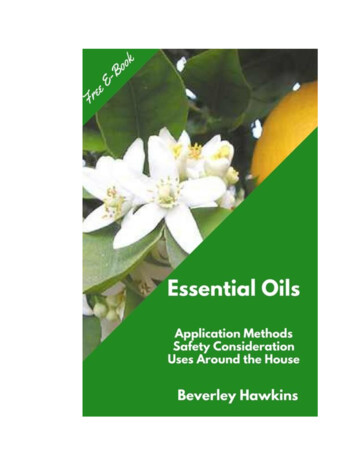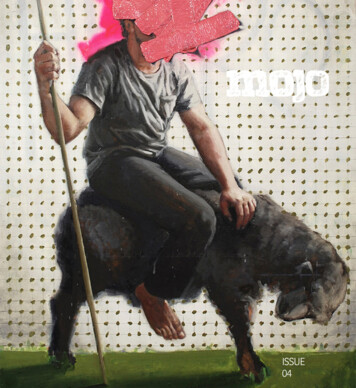
Transcription
ISSUE04
FICTION04 Matthew DexterDoctor Fish36 Peter K.Never Let Me Go64 Ray KoonslerL.A.M.E.POETRYArtworkRuss NotoArt DirectorToby Dai09 Tim SuermondtPepperoni Night10 Emily BanksHow You Know27 Jesse MackWoman Exiting the Fortune Teller’s29 Sarah LeavensThe Vital Gesture44 Mark Alan WilliamsHeaven46 Aitana AlbertiYo Naci Junto a un Rio47 Toshiya Kamei (Translator) I Was Born by a RiverEditorJay McMahan Jr.Poetry EditorJoey LemonAssistant EditorSoon WileyNon-Fiction EditorRyan GannonFiction EditorWoody SkinnerPublic RelationsKatelyn DelvauxStaffCharlie EdwardsKallie FalandaysRae HoffmanTiffany LearGarrett QuinnBrandon Rush48 Brad JohnsonSpeed Off the Edges50 Katie SchmidNowhereNON-FICTION13 Jeremy BrokMy Christmas Star of DavidINTERVIEW31 Soon WileyAn Interview with Russ Noto53 Kallie FalandaysAn Interview with Malena Morling
Equine Variation No. 1 - Oil on canvas - 60’’ x 60’’
Matthew Dexterg o to TA B L E O F CO N T E N T SDoctor FishSitting on orange cushions with our cheeks carved into fresh leather, pasty blisteredfeet submerged beyond exhausted ankles in a forty gallon tank of polluted water with deadskin floating on an opaque turquoise and Garra rufa chewing at the loose bits of dermis; itoccurred to me that the world was flat, at least until Yajñavalkya had his heliocentricvision. Though Inquisition convicted Galileo of heresy, the Copernican Revolutionwas not for naught.After bungee jumping from the Wild Canyon gondola, with Grandma attached tomy waist in the Sling Swinger, after four frozen mango margaritas, and before adequatelydigesting six piles of steaming nachos on the beach: What a wonderful idea! It was neitherthe inertia of our descent, nor the subsequent pendulum motion of our bodies as we soaredlike enormous American White Pelicans from one edge of the canyon to the other, gravityfilling my perineum with blood and my anus with unclenched tropical air—which made it sospecial.Ethereal warmth careening through a harness that looked like it couldn’t hold a babycamel, as Grandma did prior to our departure on the canopy zip-line. She waited in amammoth hammock, saving her energy for the main event. When time came she was ready.Our convivial crunchy twenty-year-old guides counted down from three—but dropped us ontwo. We plummeted and swore and clenched arms as we prayed to a god who abandoned uswith Grandpa; shadows on the granite above dried palm fronds, diminutive as ants.It was the expression on Grandma’s wrinkles—the labyrinthine message ofhieroglyphs which expanded and contracted with static in the breeze, and the horror beyondthe sclarea between the black of the pupil and bloodshot retinas of a Caucasian celebratingher ninetieth birthday in Cabo San Lucas.***
Grandma wiggles her piggies in her tank, adjacent to mine. The fish nibble away thedead cells, exfoliating the dried shards of womanhood. Mom is sitting at the palapa baracross Marina Boulevard, double-fisting frozen daiquiris: banana, strawberry, mango. Shit,she would eat a dog if it pooped pretty colors and could be blended and crushed with iceand salt on the rim. She calls herself Dusty Tortilla with Lime, and surely there is not aa cornier piece of bitter cougar at this cantina; not yet anyway. She said my feet were toodecrepit to be pampered by benevolent Garra Rufa.“No way in hell Care Bear. Your peeling-neglected piggies will kill the fish.”She said it loud enough for tourists to listen—bloodshot eyes squinting with delightbeyond three-hundred-dollar Prada shades, stoic; though betrayed by obstinate crow’s feet.***The blue-illuminated effervescence is a sight to behold: me and Grandma sittinghere after freefall, faces grimed with dried sweat and dust, the laces of our stinky Reeboksagainst the tanks covered in mud. Outside, bicycle taxi cyclists wave and poor Mexicanchildren attempt to peddle trinkets to tourists, their cheeks against the bank-teller Plexiglaslike starving blowfish. Adorning enormous sombreros, fortunate nonnegotiable foreignerswith gigantic bellies are exercising F-bombs; while the poorest: broken and anemicby a complacence they can never understand fully. The woman behind the counter shoosthem away and the room spins as Grandma sings Spanish lullabies. Mellifluous chanting,back to our wild embrace as they lifted us toward the glass-bottom gondola.***We were shivering, but Grandma lost half her t-shirt, so her left nipple wasexposed, but that wasn’t the worst part: this pierced purple tattooed specimen of magazinesfrom the fifties. Grandma never told us she had tattoos. Hairy ears were the only piercingsshe adorned with gold. Here with this silver dollar hanging like a phallus as the machineengine coiled duct-taped safety ropes into a hot mess splintered with shadows of enormousAmerican White Pelicans growing larger as if devouring the invisible space of the canyonthat held us. The arroyos cupped us like pelicans mating midday. Mom watched fromabove. The flaps of Grandma’s belly protruding like a birthday cake with vanilla frosting. Itmust have been hidden in the moldy basement refrigerator for ages. The jelly jiggling andan ambitious flying insect took a swipe at the pierced naval with a barbed stinger, butGrandma caught it between her index and knuckle and smashed its carcass into a fine dustand snorted it four hundred feet above the desert.
“Nice skull bone on your titties Momma,” said my mother.The bungee guys working the harness and control lever of the pulley agreed withnods and acclaim to the sculpture of Aztec gods. Joystick of Mario Kart caked in sweat.We had not spoken to the deities in ages, but here we were: Mom and me praying thatGrandpa was not watching us through the crack in the gondola. Grandma was licking herlips and laughing, left mammary dancing in unison with the grinding of the wench.***The Garra rufa are working their magic, this aquamarine wand, as little childrenbeg for pesos and hustlers of the worst persuasions propagandize their souls to regurgitatespiels that have inspired many a murder in front of Oxxo. My piggies are filled withblood, warmed by the soothing seawater and jaw bones of Garra rufa. The reddish logsuckers swim in apparent retrograde motion. God bless the kangal fish with a purpose; noteven these diminutive altruistic sea creatures are safe from the greedy capitalism of LosCabos. A celebrity wedding this weekend will surely feature half a dozen tanks and thedebauchery of Beelzebub and A-list a-holes and phonies who infiltrate the resort town,sparkly gluttonous hemorrhoids indulging nibble fish.Grandma grabs my wrist and winks. This is the closest we’ve been since thegondola. I can feel her shaking, smell her skin, her cracked nails massaging mywrists like a razorblade to a girl who used to cut. The cheese quesadilla with mesquitechicken is smoking in the palms of a delivery man on a rusty motor scooter that releasesmore pollution than a third-world dump truck as the room spins faster, the water bluer, thedoctor fish meaner, more obstinate, aggressive, greedy; the demeanor of Grandma’s facechanges and she begins thrashing her piggies until water splurges over four sides, alongwith dozens of Garra rufa, and the walls and ceiling close in. The rainbow puddles encirclethe stubble that has not been waxed in weeks.***We are lying on lounge chairs in front of the marble resort fountain watching theClementine sunset. Our feet are soft and pallid. Grandma grabs my palm and there is nosign of an afternoon adventure excursion written on her wrinkles. I travel those faciallines and wedges and putting greens on her pores, tracing the hours, but there is no exit tothe map and the doors have all been locked for decades. She sucks her lime and licks thepulp. Her liver spots glimmer, a constellation in a clear perfect patch of sky over the ocean.We wait for the Carnival Elation to depart, for its earth-shattering horn to blast us off to
sleep and reverberate through the arch. Another cruise ship skims the horizon. We wait tillit vanishes into the Pacific while the sky is ripening into a tangerine and the sweet nectar ofour veins is nothing beyond the purple murk of pomegranate margaritas and a decrepitgondola about to snap an umbilical cord as Grandma listens to the waves and we are alive,no more extinct than mammoths from the Holocene.
Equine Variation No. 2 - Oil on canvas - 60’’ x 60’’
TIM SUERMONDTPEPPERONI NIGHTI stand along the Grand Canal,eyeing the gondolasand one woman—love that yellow hat!But it isn’t long until I’mthinking of the canalback home, the one I toodon’t spend too much time by,rudely leaving for the city lightsand a small pepperoni piethat tastes so delicious,one bite takes me to . . . whateverthe definition of heaven is.Here in this hole-in-the-wallAmerica will always be greatand be that beacon to the world . . .alright, I am getting carried away,but love deserves exaggeration,and, no, I haven’t forgotten the yellowhat, though it’s gone now forever.g o to TA B L E O F CO N T E N T S
EMILY BANKSHOW YOU KNOWAfter the burial, grandpa taught us how you knowwhich pecans are good to eat, how you shake themgently by your ear to hear the rattlingof solid meat inside, or else the muffled sloughof rot, of fruit that fell too many days ago,now losing shape, shell softeningto meet the long dark leaves that curledtheir sharp ends up, that mossed the groundto mute our footsteps, wet our fingersas we sifted through. And on the other sideof the yard Aunt Cissy stood as if to facea crowd, shouted Mission Accomplished,and Mummy had sex with Hitler, her voicemechanic, gruff like in the messagesshe left on phones: “This is a Collect Callfrom Cissy’s Clone” and my mothersaid she couldn’t know now who she was,that she was sick and her sickness was one of the bloodthat sits watching you to decide when to uncurlits limp body to bore through the walls of its cell,and it touches you gently, you can’t even feelhow it strokes through all of you, smotheringthoughts like babies gently in a bed and they saidthe medication didn’t work for her, the institutionssent her back after weeks when the other patientsg o to TA B L E O F CO N T E N T S
complained, and she said she’d been takenand her body now was just a replicathey made to silence us. And I stopped myselfwondering how we knew she was wrong,that her real body wasn’t tied upin some desolate government room, unlit,strung with wires and tubes and expressionlessagents set square in the door, the shadows thickeningacross their chests while whatever this wasstood here, malfunctioning, stuckon a single phrase: Mission Accomplishedwhile we kept our heads to the groundand knocked our little fists against pecans,saving the good ones in our plastic bagsand leaving the rest to decay,trying not to hear her just in caseit got inside us.
Beauty and Violence No. 1 - Oil on canvas - 33’’ x 43’’
Jeremy Brokg o to TA B L E O F CO N T E N T SMy Christmas Star of DavidWhen I was eleven-years-old, two years before my Bar Mitzvah and a month beforeChristmas, during that post-Thanksgiving chill when the sky’s burnt orange begins fading intoDecember grey and the smell of wood-burning fireplaces saturates the neighborhood, that’swhen I found it. Just lying on the ground like a beautiful castaway. After the cherry pickers left, I snuck into our neighbor’s front yard and picked up a limb no more than five or sixfeet long, but still with most of its needles intact. It looked about right for my plans. I quicklystuffed it down my jacket and zipped it tight so no one would know what I was doing. I knewexactly what I was doing. Kismet.***I don’t remember exactly when my infatuation with Christmas began—somewhere between my preschool class rendition of Twas the Night Before Christmas and my first year ofHebrew School. And it wasn’t as though I had become ashamed of my inherited faith, or that Ihad finally found Jesus after my four or five long years of searching. It had nothing to do withreligion or spirituality. My fascination was as secular and aesthetic as Santa Claus and muchmore believable. I was a kid, Christmas was shiny, and I wanted it. Hanukkah just lacked thatsame holiday sparkle.The scene outside of my suburban window every December was out of a greeting card.Snow settled softly on the pavement below and along the frozen gutters of the rooftops above.Reindeer glowed beneath their plastic skins and strands of multi-colored lights burned into thenight. I imagined a giant calligraphy pen swooping across the sky and writing “A Merry Christmas to You and Yours” just above the rooftops, curls of smoke from happy chimneys nonchalantly billowing around the curves of the “Y” and “S”. The perfect Christmas card neighborhood: each house standing as a shining beacon of cheer connected to the next, creating a chainof light that wrapped around the corner and up the hill like a living Christmas tree. Then there
was our house—the perpetually broken bulb in the strand that screwed up the whole thing.I guess we weren’t completely broken, more like blinking intermittently thanks to mydad. He came from a long line of unhandy people, but believed that he could break the chainwith his kids. I think the idea was that because he was “teaching” as opposed to simply “doing,”the home repair gods might finally imbue him with the handyman know-how so long denied tohis family. It would then be his penance to pass it on to us. We didn’t have a toolbox per se,but instead an old wash bucket that held the hammer, wrench, and whatever other odd toolswe owned. I’d drag it behind him as he scouted the house for the repairs that we would tackletogether. Videocassettes of This Old House were faithfully referred to when the living roomlights went out after fixing the doorbell or when the kitchen sink wouldn’t stop overflowing after tightening the pipes.“Just hire someone!” my mom would plead, blow-drying the soaked pages of her cookbooks. “Not all the kids need to go to college—hire someone!”“Why?” my dad would ask. “We almost had it that time.”That Hanukkah, my dad had been dutifully installing book shelves into every room ofthe house, an improvement he deemed an absolute necessity, he created the Mega-norah andimmediately instituted its erection as a long-standing family tradition. A Mega-norah is exactly what it sounds like—a giant Hanukah menorah made from two-by-fours, a stepladder, andchutzpah.Handydad begins construction of the ritual Mega-norah with an eight-foot tall stepladderthat acts as its base. Two long wooden planks are threaded through the top rung of the ladderso that they protrude evenly from each side, and are then hot glued into place. I wish I couldsay this is the only time of year that my dad feels the need to hot glue something into place.Next, nine large candles are gathered, mostly bargain-bin scented candles, but he has beenknown to use flashlights in a pinch. These “candles” are of course hot glued into place—four onone side of the wooden arms, four on the other, and one in the middle, the shamash, on the topstep of the ladder. And there it is, a giant Hanukkah menorah—the Mega-norah, placed proudlyin the front yard, my dad’s attempt to keep up with the gentile Joneses.“Do you see? Do you see them?” he would clamor at us from the front yard, gesturingtowards the stopped cars outside of our house whose drivers wondered if they should call someone about the burning cross in the front yard. “They’ve never seen anything like it!”So every wintry eve of Hanukkah as a flood of neon began to swirl around our home, myfamily trudged outside to light the Mega-norah just as our ancestors would have done for thou-
sands of years had they access to long-reach lighters and hot glue guns. Cartoon figurines andformations of Christmas lights seemed to leap into the night, towering over my dad’s flickeringcreation as if just waiting to crash down upon it and drown it out. But it never happened. In theuniformed sea of suburbia, you can always spot the Jewish house at Christmas.***When I was very young and we visited my Grandma Molly at Christmas time, she’d bringthe chairs to the kitchen counter so we could watch Christmas specials together. We’d watchthem on her little black and white TV set, me standing on my chair, leaning over the counter, elbows propping up my head, chin digging into my palms, while she bustled back and forth making me hot cocoa and Jell-O snacks, food which I assumed for too long was a normal Christmastradition.“I can’t believe you’re watching that schlock,” my mom would say, passing through tomake her coffee.Inserting bits of Yiddish into conversation is one of my mom’s favorite secret pasttimes.When I note that Kismet doesn’t really apply to finding a parking space at the grocery store orfiguring out who did it on Law and Order before the first commercial, she is surprised everytime to learn that the word has come out of her mouth. Isn’t it funny how she can’t stop sayingthat word? And isn’t it strange how she so seamlessly and effortlessly uses Yiddish in everyday conversations even though she didn’t grow up with it, like us? Ah, Kismet.But she had a point about the TV. It distorted the holiday in my five-year-old mind. Inthese Claymation marathons Christmas wasn’t established as a sacred commemoration of a savior’s birth, but rather as a mystical-magical spectacular full of flying reindeer and talking snowmen, all of who could sing with perfect pitch. Entire towns bonded together in yuletide harmony, using nothing but the Spirit of Christmas to fend off whatever monsters, or bad guys, ormonster bad guys that were bent on destroying Christmas that year. Why did they hate Christmas so much? What could they possibly get out of destroying it? Who knew? But it made forsome great entertainment in half hour chunks.“Why don’t you turn on Sesame Street for him?” my mom would ask. “He loves SesameStreet.”“Oh, he doesn’t need that,” Grandma Molly would answer while wrapping me up in a hug.“We’re going to take a walk through the neighborhood to look at all of those decorations, aren’twe, buddy?”“Sorry mom, we have to get on the road early,” my mom would respond, looking into her
coffee and out of Grandma Molly’s eyes. “Sam has an early meeting tomorrow, we don’t want tobe on the road late.” Another deep sip would avoid the resulting glare. “Look, I’m sorry.”***I braced the branch tightly against my body and zipped my coat around it to avoid suspicion from any nosy neighbors, even though its upper half stuck out above my head while thelower half was also visible below my jacket line as I ran. Every step where the branch didn’tsmack me in the face, it hit me in the crotch like some sadistic human metronome and I hopedno one was watching. I feared what a phone call to my house might sound like.“Hello, Jane?”“Oh hi, Becky. How are you?”“Hi, not much—I mean good, um, I was just wondering something.”“Well sure, Becky, what is it?”“Well, um, is your family Christian now?”“Excuse me?”“You see, I just saw your son bringing home a Christmas tree so I just thought I’d ask ifyour family would like to come over for eggnog and caroling. It’s Thursday night, nothing toofancy, but if you all could wear your matching Christmas sweaters, there will be a photographerthere so. Jane Jane?”I cut across my neighbor’s yard so that I could enter the back utility shed undetectedfrom the house. No one would come here until the spring when the screens were put back inthe windows. Silently, I positioned the rakes and lawn mower into a fortified haven for my little Christmas branch, a little lighter of needles, but still just as beautiful. It all seemed like itcould be some kind of TV Christmas special to me—keeping hope alive, taking joy in the smallthings, and all that junk. It made me feel special like everyone else.***There is no wrong way to spell Hanukkah, though according to my computer’s spellcheck there is no correct way to spell it either. Get somewhere close to a phonetic pronunciation, throw in a couple extra N’s and K’s, maybe an umlaut or two, and we’ll take it. Seriously.That’s a pretty accurate representation of Hanukkah on the whole—it’s weak, accommodating,the adorable, boyish sidekick to Christmas’ mighty superhero. It’s not even a major holidayby Jewish standards. Hanukkah was only made to seem larger so that manufacturers wouldhave a way to sell stuff to Jews at Christmas time. Memorial Day is probably Hanukkah’s closest American holiday equivalent. Like other Jewish holidays such as Purim (slant equivalent
of Halloween) or Tu Bish’vat (Arbor Day), Hanukkah simply commemorates yet another timewhen someone tried to kill off the Jews, and yet again, it didn’t take.***When I was nine years old, I loved school and I was in love with third grade. It was thatmagical time in life before hitting puberty when girls were still just weird-looking boys whodidn’t like dirt, popularity rose and fell with the acquisition of the latest video game, and I wasthinking clearly. I did some of my best work that year, some serious art pieces, mostly in watercolor and glitter stick, but some in pipe cleaner too. Christmas time burst with artistic possibilities. Past teachers had thought it was cute that I liked Christmas so much and believed theywere the ones ushering me into this new world.“And you say Santa gets eight magical, flying reindeer?” I might say to them. “Nine withRudolph? Get out of town!”In actuality, I knew this world well, very well I thought, just as well as anyone else in myclass.It was the day that my class was making Christmas trees from construction paper—afavorite medium of mine—when Mrs. Volmer approached me. She knelt down on her tan corduroy pants and nudged her narrow-framed glasses down her nose so that she could make effective eye contact with me. She was the kind of teacher who tried to make a difference every day,and believed establishing good eye contact was a good place to start.Mrs. Volmer gently slid the jagged-cut, green triangle from my desk.“Jeremy, would you like to make something else for art class?”“No,” I said, “I’m making a Christmas tree.”A boy with a rat-tail looked up from his desk for a moment before quickly returning to hisown jagged, green triangle as if to confirm my point.“Well sure,” she said adjusting her position on the floor, “but maybe there’s some better—something more geared towards you that you’d like to make.”“Um, I dunno.” I had no idea what she was talking about. I wondered if she was referringto my experimental work with googly-eyes that had been so well received during Halloween.Or perhaps this was finally my invitation to have my piece appear in the middle of the wall outside our classroom, the coveted prize for all third grade artists.“Well here, why don’t we do this?” She quickly cut out a perfect green triangle and laidit on top of my frayed one so that one triangle was upside-down and the other was pointing upwards.
“See?” she proudly appraised her creation. “The Star of David. That’s your star. Prettyneat, huh?”I nodded or made some gesture close to it before she was content to walk away.It turned out that my initial suspicions had been correct and outside of our classroom mystar stood in the middle of the forest of Christmas trees that hung on the wall.I later learned that Mrs. Volmer had been helping me feel “more comfortable and less outof place in my surroundings.” I had discovered this while overhearing a conversation betweenher and another teacher where Mrs. Volmer had also mentioned how she just couldn’t figure outwhere the other half of my star had gone. It was just a single green triangle now, frayed andpointing upwards, as though someone had torn off the other half.When I told my mom about Mrs. Volmer’s nefarious scheme to hijack my art project, shefailed to respond with the instantaneous rage-fury that I had wanted from her. She squeezedme in a hug and said she’d talk to Mrs. Volmer, but told me that I should try to think of this asan opportunity to show everyone how special I was.“When I was a little girl I never had a chance to stand out. I never had a chance to do anything. Don’t you want to show everyone how special you are?”In a way my mom was my first conduit to that other world of mistletoe and holly. Beforeconverting to Judaism my mom had been raised Protestant, baptized and all that, but her family had never been very devout, not as she got older anyway. And so in high school when shemet a nice Jewish boy she confidently decided to trade in her jingle bells for matzo balls, andher original sin for Jewish guilt. I spent many December nights at my window looking into ourneighborhood and thinking it wasn’t fair that she had gotten to make a choice, but I hadn’t. Itwasn’t fair that her choice affected me. I was born into following a religion that despite myextensive Hebrew schooling, I barely understood. But I understood Christmas with its flyingreindeer, talking snowmen, and Jell-O-snack-cocoa drinks.***Grandma Molly had never really seemed to approve or disapprove of my mom’s conversion and marriage to my dad. She never really seemed to care one way or the other. My momhas suggested that she had thought this unusual since her mom always had an opinion on everything, and always made sure my mom knew what that opinion was.“As long as you’re happy, Janie,” Grandma Molly had told my mom, which made my momworry.Ultimately, it was about getting grandkids for Grandma Molly. Her first husband died
when my mom was just nine years old and my Uncle John was six. Grandma Molly immediately became the family’s full-time provider and little Janie became full time mom to herbrother while only in elementary school. My mom cleaned the house, made the meals, walkedJohn to all of his activities—she didn’t really have time for any of her own—and did all of theordinary things that kept a house in order. Their family dynamic was one that operated betterwith implied orders and slams of the door than with spoken words, but it was a family that operated. My dad notes this. My mom doesn’t like to talk about her childhood. Grandma Molly sawgrandchildren as a chance to retry motherhood, maybe try it for the first time. What she didn’tsee was how her daughter and son-in-law might have plans for her family that didn’t involveher.What she didn’t see was her daughter moving across the state to Pittsburgh where herhusband would begin law school and I would be born, followed by my brother and sister. Welived nearly five hours away from Grandma Molly, but when I was young we’d use the Christmas break to travel across the Pennsylvania Turnpike to find Grandma Molly and her new husband Cal waiting for us in their driveway. No church services, no preaching, just every December 25th spent together.Grandma Molly threw down the whole megillah for Christmas: honeyed ham, candiedyams, and desserts with multiple layers. Christmas crooners on the radio, pageantry paradeson the TV, Whos playing Who-tumblers, Who-rumblers, and Whos playing holiday Who-ball inthe yuletide Who hall—you know, the Whole megillah. Grandma Molly’s house was decorateddiscreetly—a wreath neatly hung on the front door with a few strands of white lights stationedon the trees.“Keep it classy, buddy,” Grandma Molly had said.On Christmas Eves we’d all walk around the neighborhood to look at all the other houses,lit up like neon motel signs, Grandma Molly pointing out how “tacky” they all were. Secretly, Ithought we were actually jealous of these other houses, and every house I pointed out was onethat I wished we could all live in together.Most vividly I recall waking up to the Christmas tree in the morning. I didn’t think of it asclassy or tacky, just beautiful. Tidy red ribbon tied in bows around every branch mingled withlustrous silver ornaments in perfect formation. Everything in its place. Its splendor was allencompassing on those mornings when everyone seemed pulled in to its presence.Then one year we didn’t go to Grandma Molly and Cal’s for Christmas. We didn’t see themat all that year, or the next. It turned out that my mom and Grandma Molly had had an argu-
ment, an argument over something concerning my mom’s method of raising her kids. Nothingdealing with religion as far as I know, but maybe it did. I don’t know. We were never told anything because we were so young at the time, and as we got older, it became more difficult to ask.My sophomore year of college in Indiana I was on the phone with my mom, trying to convince her that it made more sense for me to spend the Christmas break there when it came up.“C’mon mom, the plane ticket is too much. It’s just smarter this way.”“That means we’re not going to see you again until May. That’s almost a year.”“It’s not even ten months.”“And where are you going to stay?”“Mike said I could stay with him and his family. You love Mike! Remember how he’s soclean and polite, and how maybe that could rub off on me?”“And you didn’t come home for Rosh Hashanah or Yom Kippur this year, sweetie. Notthat it matters to me if you go to services. It’s just good to have you home. You know I respectyou to make your own decisions.”The art of Jewish guilting is a craft honed over time, passed down through the generations for centuries. Never having had a Jewish mother, my mom’s attempts at it are largelyworks in progress.“You do what you feel is best, right? Whatever you want, it’s fine by me. But wouldn’t itbe nice to get away from the stress of classes for a little, huh? Do they even have services atthat kvetchy school of yours, do they?”“That’s not what kvetch means, Mom.”“Yitzhak Yirimiahu!” Where use of the middle name typically signals the coming of hardorders from most gentile mothers, the issuing of my Hebrew name by mine meant the additional unwrapping of guilt. “You’ve never been away from home for Hanukah or your birthday, butif your heart’s set on this and you really want to
mammoth hammock, saving her energy for the main event. When time came she was ready. Our convivial crunchy twenty-year-old guides counted down from three—but dropped us on two. We plummeted and swore and clenched arms as we prayed to a god who abandoned us with Grandpa; shadows on the granite above dried palm fronds, diminutive as ants.
